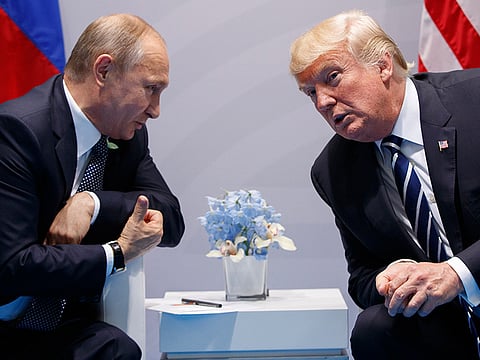US can avoid another arms race with Russia
Using tough diplomacy in conjunction with allies could provide President Trump a way to achieve a path toward improving relations with Moscow

Several parts of the US-Russia arms-control and non-proliferation architecture are cracking due to a combination of Russian misbehaviour and American neglect. The question is whether the Trump team has the will and skill to repair those cracks before that structure comes crumbling down.
Complicating the effort is the fact that US-Russia relations are at a historic low point, following Russian interference in the US presidential election, the Russian intervention in Ukraine and an escalating cycle of sanctions and diplomatic retaliation. The arms-control community is urging the Trump administration to work with Russia to address big problems with our cooperation before it’s too late. Some Republicans in Congress, however, are eager to confront Russia on arms control, ramp up US retaliation and even push for withdrawal from these agreements. For US President Donald Trump, who views the agreements as bad deals struck by his predecessors, saving them is a hard sell. But he should carefully consider the benefits of these deals before throwing them away.
One such troubled agreement hit the newspapers last week when unarmed Russian air force jets flew over the Pentagon, CIA and other sensitive national security sites, alarming many Americans. Even in Washington, most are not familiar with the Treaty on Open Skies, which has allowed the United States, Russia and 32 other countries to fly over each other’s territory since 2002.
Russia has been violating the treaty for years, according to the State Department, Defence Secretary Jim Mattis and the Senate. Russia doesn’t allow flights over key parts of its territory and takes other steps to keep the United States and other countries from realising their treaty rights. Some in Congress want the US government to place tit-for-tat restrictions on Russian flights. Some military leaders would prefer to see the treaty go away altogether, because of the information Russia is able to collect, given technological advances. Congress is also planning to soon confront Russia on the Intermediate-Range Nuclear Forces Treaty, or the INF. Russia has been violating the INF for years, according to the US government, by developing and deploying a new cruise missile that violates the treaty’s range limits, threatening Europe.
Both the Senate and House versions of the defence authorisation bill would provide tens of millions of dollars for the United States to develop its own new cruise missile, potentially putting America in violation. Senate Democrats are planning to fight that provision when the bill hits the Senate floor next month.
Last November, Barack Obama’s State Department met with Russia on the INF treaty. The talks were fruitless, but now efforts to reestablish US-Russia negotiations are underway. Undersecretary of State Thomas Shannon met with his Russian counterpart Sergei Ryabkov in Washington on July 18 and agreed to hold “Strategic Stability Talks” in the near future. Thomas Countryman, the State Department official responsible for the issue until January, told me that if Congress put the US in violation, or if Trump pulled out of the treaty, the country would lose out. In their first phone call after Trump’s inauguration, Russian President Vladimir Putin proposed a New Start extension but Trump refused and called it a bad deal, after he paused to ask his aides what it was.
America’s current low point in relations was not caused by Russian misbehaviour on arms control; it was caused by Russia’s interference in the US democracy. But dealing with arms-control issues using tough diplomacy in conjunction with allies could provide Trump a way to achieve what he claims to want most — a path toward improving relations. In the process, Trump could also avoid another arms race.
— The Washington Post
Josh Rogin is a columnist for the Global Opinions section of Washington Post. He writes about foreign policy and national security.


